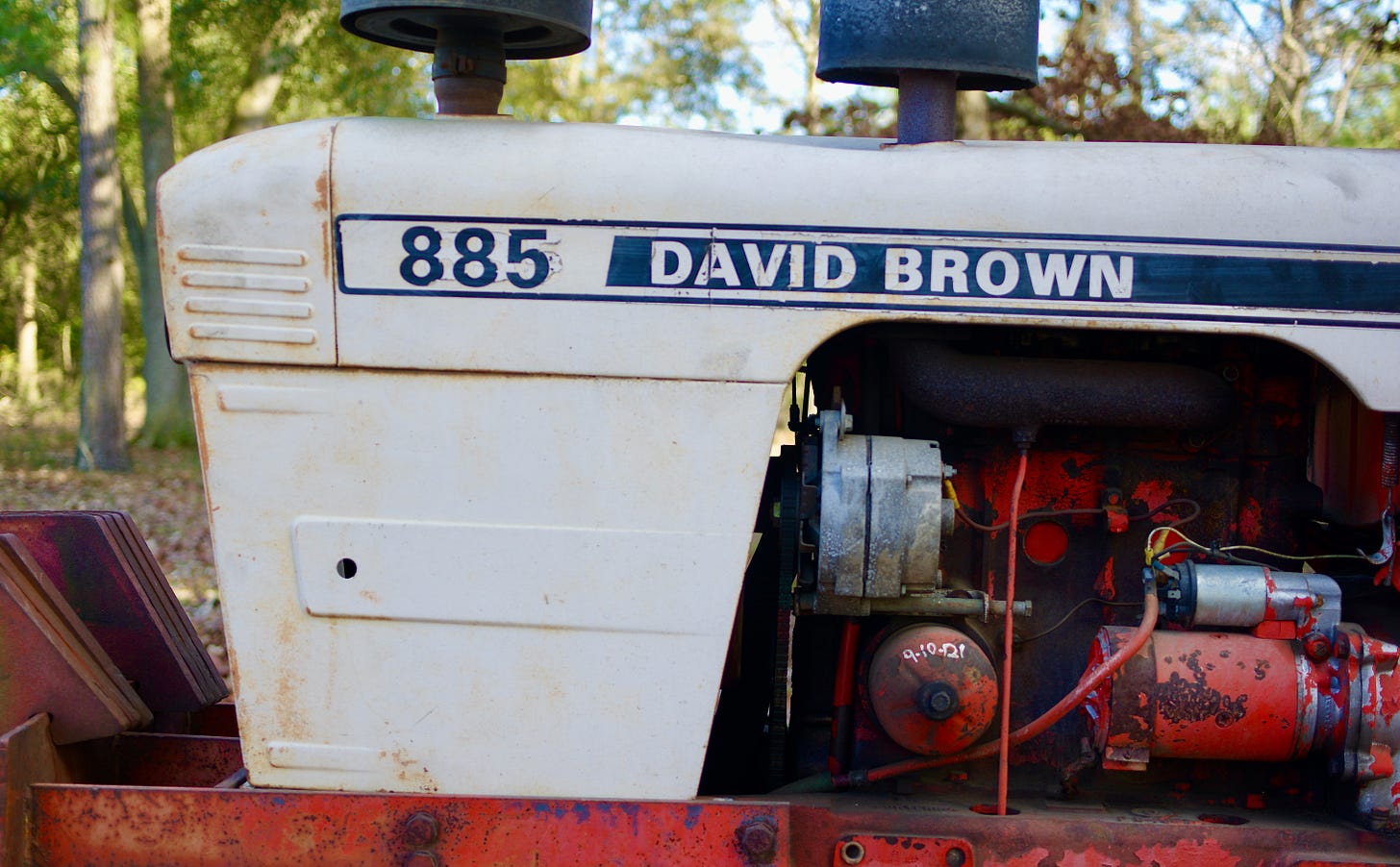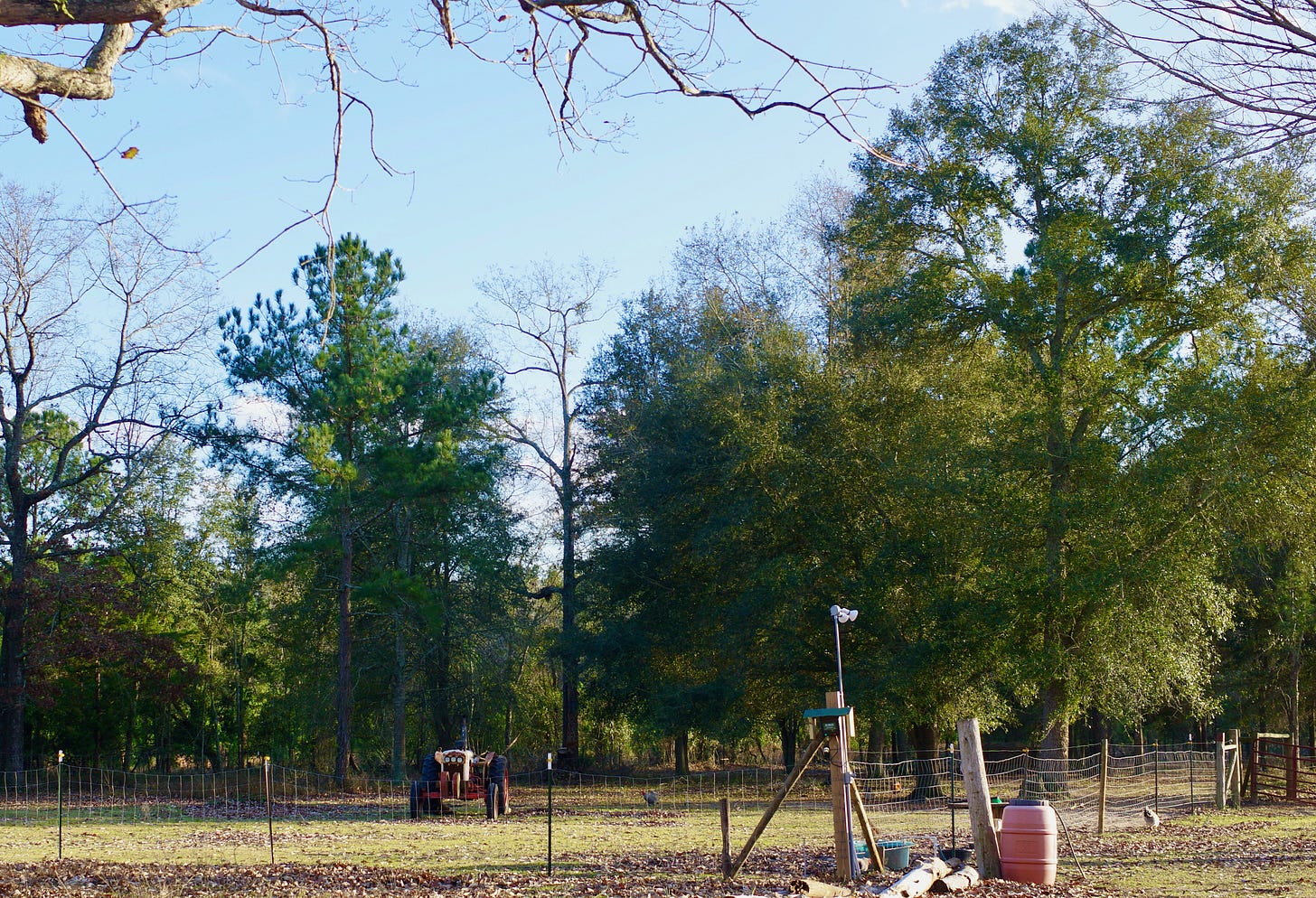Water oaks are not long-lived trees, and they begin to shed parts of themselves as they age. One in the horse pasture has been languishing, in the slow stages of dying. Woodpeckers excavated holes in its trunk, hunting insects that burrow in rotten wood.
Snags are important to leave standing for this purpose, and we left this one for years.
The problem was that the tree leaned toward the power lines along the dirt road. It was close to 80 feet tall. We need firewood, so my husband, Raven, decided to take this water oak down. I heard him working out in the horse pasture, running a chain saw.
Chain saws, being dangerous tools, bear watching. I walked out to check on things.
Raven was on a ladder fifteen feet up the obviously rotten oak. He had a chain hooked up there around the trunk of the tree. I watched him climb down, notch the oak on the side he wanted it to land, away from the power lines and the road, then string cables and chains to our tractor, an antique David Brown, parked about 150 feet away.
Raven waved me over. He needed help. My job was to get on the tractor and keep tension on the cable while Raven cut the tree from the far side.
I didn’t like the entire setup. But I did everything I was told.
The job got complicated because I had to let out on the clutch while using the accelerator while also steering while also pressing down a lever that engages both back tractor tires, for more power. That’s called a rear differential lock. The tractor and I pulled valiantly. The tires would spin, and the tractor would slip backward, and the tree would sway hazardously.
Our four horses had been shut into an adjacent pasture, and they watched the operation from the fence.
Looks like y’all need our help, they wanted to say.
Nope, I called to them. Don't need your help. This tractor is 40 horsepower, which means we’d need 36 more of y’all.
Now Raven was making the motion to GET ON IT, waving violently. Go, go, go!
I jammed the rear differential lock and let out the clutch and hit the accelerator. Right then a cable on the come-along broke.
Now the tree had cuts on both sides of its trunk, it swayed radically toward the power lines, and the cable was broken.
He he he he he, the horses laughed from the fence. He he he.
Three of our neighbors have tractors with more horsepower. There was nothing to do but quickly make phone calls. The first neighbor was out of town, shopping near Savannah. The next was out of town. The third, a young guy who’s always smiling, who drives a school bus morning and afternoon, bless him, rushed over on his backhoe. We re-strung the cables and the come-along. Landon set his brake and in one tiny pull the rickety old tree was down.
The horses seemed satisfied. Now that’s some horsepower, they said.
Analog Life
I write about this because I want to name a huge divide that most of us are experiencing. Our lives are increasingly online—most of the day we live virtually. Work is online, education is online, community is online, reunions are online. I’m talking to you online.
Now we’re dealing with artificial intelligence, as opposed to what we’ve always thought of as intelligence.
Some real things left to us are
our own bodies
our children
our homes
our pets
whole foods and the preparation of food
gardens
tools
hikes and paddles
books and paintings
This week, in the aftermath of snow and ice in places that normally experience little of those things—or places that have become unused to such winter events—many people suffered mishaps like frozen pipes. Over the years we have developed a system here at the farm where on freezing nights we turn off the water at the well and empty the pipes. This saves Raven a lot of work.
Even so, last week he was forced to repair three busted pipes.
One long-distance friend experienced a half-inch split in her copper pipe. The estimate for repair was $400.
“People can’t even do simple things anymore,” Raven said.
This is Encouragement
When Raven was young he watched his stepfather repair copper pipes. That consisted of cutting a broken pipe with a special tool, inserting ends of connectors into a new section of pipe, and using a torch and solder.
He explained all this to me. “Yes, copper takes more skill than PVC,” he said. “But if my copper pipe broke I would invest in the tools and do it myself.”
Zones of Competence
I challenged him. "But copper repair is my Zone of Incompetence,” I said, meaning why shouldn’t I be doing something I’m good at? “What do you have to say about that?”
“If you have bucketfuls of money, then definitely, find someone to fix the pipe and pay them what they want. As for me, I would invest in the tools for less than one-tenth of the cost to pay someone,” he said. “That is, if you can even find a repairperson.” He reminded me that YouTube videos will tell you all you need to know. Scores of people want to teach skills.
“My main point,” he said, “is that 99 percent of repairs can be done by anyone.” He continued.
“What we feel competent to do is nowhere near what we really are competent to do with just a bit of guidance.”
Considerations
Strength could be an issue.
As could safety (electrical repairs, for example.)
As could disabilities.
A necessary tool could be exorbitantly priced, and purchasing it would not benefit you sufficiently. (Although a high-priced tool is resalable.)
Summary
We humans are firmly attached to an analog life, no matter how far out into the “cloud” we zoom.
If you zealously pursue an analog life, you will experience less fear and anxiety.
You will be stronger physically, mentally, and emotionally.
You will be more confident, because more of your troubles and challenges you will be able to handle yourself.
The more skills you learn, the better able you are to help others.
My Analog Dream
I’d like to become a better cook. I’d like to learn some basic masonry, so that I can build a small wine-bottle wall around one of my pollinator gardens. I’d like to learn fermentation using koji. I’d like to listen better to trees and other beings. I’d like to figure out more effective ways to get rid of pesky weeds and insects in the garden. I’d like to plant more trees. I want to sew some outfits in the style of Alabama Chanin. I’ve picked my guitar back up after many years with it locked in its case, and it needs a small repair (the plastic strip along the edge is coming loose), so I need some luthier skills. I’d like to be a better horsewoman. I want to spend more time in boats. I’d like to help Raven learn to sail.
Now You
What are some of your analog dreams?
Radical Sustainability
What I’m Reading
Upstream, a collection of essays by Mary Oliver. I ordered a used copy of this book because someone (I forget who) described an essay in it, “Bird,” as the best essay ever written. “Bird” was not, for me, the best essay ever, but another essay in the collection, “Staying Alive,” may be.
Steal Like an Artist: 10 Things Nobody Told You About Being Creative, by Austin Kleon. Raven picked up this art book from the library. I got a couple of good ideas from it. One of them is what this post is all about: Use Your Hands.
In the digital age, don’t forget to use your digits.
Lynda Barry
Writing Prompt
My hands…
Write about what your hands have seen or what they can do. (If you decide to post, feel free to use the hashtags #writingwithjanisse and/or #tracklesswild.)
Recipe
Not long ago Substack marketers sent me a newsletter they thought I’d like. It was about writing, and it had tens of thousands of readers. The tagline said something like “Tips on writing. No recipes.” If you think about that for one minute, you’ll recognize layers of judgement in those two words, “no recipes.” It makes me want to include a recipe in every edition of Trackless Wild.
So here you go.
A bottle of cordial made of ripe figs in June brings back to me, deep in winter, halcyon days among a perfumery of green leaves shaped like hands.
(Many thanks to Gary Grossman for the recipe, sent to me back when I was inundated.)
Personal
If you read this far, then I can tuck in something personal, right? My son, Silas Ray-Burns, is coming home for my birthday! I was born in 1962, and I turn 62 on 2/2/24, and that seems like the kind of birthday to celebrate well. Silas lives in Massachusetts and will be here for 10 days. He’s a photographer & music videographer—I use his photographs a lot, so if you see a photo by Crumbstarz, that’s Silas.
Journey in Place
Tomorrow the fourth Exploration for our year-long course in place-knowing comes out. You are not too late if you’d like to join. You can start the course at any time—including tomorrow—and joining gets you a real, analog book of all 52 Explorations at the end of the year.
Each week’s Exploration contains a tiny essay, a feet-on-the-ground exercise, a writing prompt, and further readings.
What has been astounding and inspiring are the Comments. We’re getting hundreds of responses to the writing and the other exercises. People from all over the United States and the world—people like you and me—have been describing their places, walking their places, mapping their places, listening to their places, and processing deeply complicated feelings about place. They have been creating really fine work. Check out a few stories I included in last week’s newsletter, Old Maps to the Secrets of this Land, if you didn’t see those.
You become a member of this course by subscribing to this newsletter at any level, monthly or annually.
Thank You
Thank you for reading. If you know someone whose life might be benefitted by being part of our Trackless Wild community—folks who are living a nature-forward, deeply satisfying, kindness-matters life—please invite them to join us.









A friend and I fixed a broken pipe at the wellhead last Sunday. I can’t even explain how happy this makes me. To know which tools. To know what to buy at the hardware store. To have the peace in my body to pull it off.🌱
I'm constantly heartened, maybe weirdly, by what I can learn to do myself via YouTube. It's been hard finding contractors for anything for years now where I live (new home construction has not let up for a long time, and repairs are less profitable for most contractors). Like fixing the dryer, replacing the cord in the weed whacker, field-dressing a deer, taking out that one shelf in the fridge that for some reason isn't in the manual and it badly needs washing because someone spilled sauerkraut all over it, ...